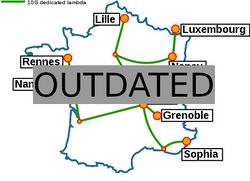Grid5000:Home
|
Grid'5000 is a large-scale and versatile testbed for experiment-driven research in all areas of computer science, with a focus on parallel and distributed computing including Cloud, HPC and Big Data. Key features:
Older documents:
|
Random pick of publications
Five random publications that benefited from Grid'5000 (at least 2937 overall):
- Pierre-Etienne Polet. Portage des chaînes de traitement sonar sur architecture hétérogène : conception et évaluation d'un environnement de programmation basé sur les tâches moldables. Informatique cs. Ecole normale supérieure de lyon - ENS LYON, 2024. Français. NNT : 2024ENSL0004. tel-04633261 view on HAL pdf
- Donatien Schmitz, Guillaume Rosinosky, Etienne Rivière. Justin: Hybrid CPU/Memory Elastic Scaling for Distributed Stream Processing ⋆. DAIS 2025 - 25th International Conference on Distributed Applications and Interoperable Systems, Daniel Balouek; Ibéria Medeiros, Jun 2025, Lille, France. pp.1-17. hal-05081993 view on HAL pdf
- Cassandre Vey, Adrien van den Bossche, Réjane Dalcé, Georges da Costa, Olivier Negro, et al.. Experimenting IoT-Edge-Cloud- HPC Continuum on Existing Platforms. 2025 IEEE 25th International Symposium on Cluster, Cloud and Internet Computing Workshops (CCGridW), IEEE, May 2025, Tromsø Norway, Norway. 10.1109/CCGridW65158.2025.00026. hal-05147272 view on HAL pdf
- Baptiste Jonglez, Matthieu Simonin, Jolan Philippe, Sidi Mohammed Kaddour. Multi-provider capabilities in EnOSlib: driving distributed system experiments on the edge-to-cloud continuum. DAIS 2025: 25th International Conference on Distributed Applications and Interoperable Systems, Jun 2025, Lille, France. pp.25-42, 10.1007/978-3-031-95728-4_2. hal-05052776 view on HAL pdf
- Romain Pereira, Thierry Gautier, Adrien Roussel, Patrick Carribault. Measuring and Interpreting Dependent Task-based Applications Performances. 15th International Conference on Parallel Processing & Applied Mathematics - PPAM 2024, Sep 2024, Ostrava, Czech Republic. pp.227-241. hal-04767262 view on HAL pdf
Latest news
Failed to load RSS feed from https://www.grid5000.fr/mediawiki/index.php?title=News&action=feed&feed=atom: Error parsing XML for RSS
Grid'5000 sites
Current funding
As from June 2008, Inria is the main contributor to Grid'5000 funding.
INRIA |
CNRS |
UniversitiesUniversité Grenoble Alpes, Grenoble INP |
Regional councilsAquitaine |


